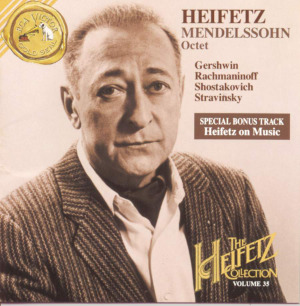
Jascha Heifetz (violin)
The Heifetz Collection Volume 35
rec. 1947-70
Presto CD
RCA-BMG 09026 61766-2 [62]
RCA Victor-BMG and Heifetz repaid each other’s fidelity and artistry many times over. The dividends continue to roll in. The label’s numerous “Heifetz Collection” was but one aspect of this. This disc is volume 35 in that line.
The disc lays claim on the many Heifetz admirers but ‘his’ Mendelssohn Octet – which is the single longest work, at approaching 28 minutes – is not the draw; quite the opposite. The reading is hurried and harried. The players give every sign of feeling that they must vie each other and that this is its raison d’être. They steam-roller through this music of huntress’ élan, spindrift beauty and idyllic calm. What’s more: they seem guiltless about subverting those qualities. Speed is one thing but here there is a steely obsession with velocity and volume; witness the third movement, but this harshness permeates everything. It taxes the mind’s “lungs” in almost the same way as Golovanov in the Midsummer Night’s Dream Scherzo or Ovchinnikov in his death-defying Francesca da Riminim (Olympia). The difference is that those two conductors keep their sextant fixed on the music’s fleshy heart. To hear what elite US players can do at the other pole from Heifetz “and clan” listen to Leonard Rose and Isaac Stern in Brahms’ Double or Serkin in Brahms 2. It’s not a race, boys and girls; by the way, the eight players include Virginia Majewski whose viola d’amore makes such an emotionally telling impact in Herrmann’s score for On Dangerous Ground. The same chromium and tungsten undermine Heifetz’s and Sargent’s Brahms and Bach Double concertos also on RCA (GD86778)). Much the same blow-torch frigidity can be heard in his Sibelius and Glazunov for EMI (HMV; Naxos). For the Mendelssohn I align myself with the approach to be heard in the 1967 recording by the Academy of St Martin in the Fields with an ensemble including Hugh Maguire, Neville Marriner, Iona Brown, Stephen Shingles (viola), Kenneth Essex (viola) and Kenneth Heath (cello). This happens to come in a 31:43. The old Philips version with I Musici is also still a front-runner in which the music is caressed rather than smothered with dense wirewool pillows.
The shorter pieces here are vivid and admirable. Seven minutes of Toch cut the cobwebs to shreds and the music bears up well under this engaged scrutiny. I am left with the image of intricate helter-skelter mice wielding razor blades. It works. The violin is well forward as you might expect but this does no disservice. Rachmaninov’s Daisies, as transcribed, is intense but this amplifies the song’s soaring and singing. Robert Russell Bennett – known for his stirring score for Victory at Sea – delivers up a pocket charmer in the form of A Song Sonata. The artfully-titled Shulman (review) piece sheds sparks all around. Devastatingly centred is the Stravinsky ‘Berceuse’ from The Firebird. This is a luminously lit treasure. The disc culminates in Gershwin’s ‘It ain’t necessarily so’(from Porgy and Bess) which turns out to the last word in slipperiness and slancio. The ending shouts joyous victory – something I had not been expecting from this work.
After my comments on his Mendelssohn I should add that Heifetz is not a completely blind spot for me. His Walton and Elgar concertos (Naxos 1 Naxos 2) superbly personify excitement and romance … and there are more.
Heifetz’s innocently self-effacing and pithily expressed wisdom is to be heard in his ten-minute talk which ranges from scales to the sea to electric cars. The liner notes by John Pfeiffer are a cut above and neatly balance personal insight and hard information. The chronology is useful.
Rob Barnett
Help us financially by purchasing from


Contents
Felix Mendelssohn (1809–1847)
Octet in E flat major, Op. 20
Ernst Toch (1887-1964)
Divertimento, Op. 37, No. 2
Serge Rachmaninov (1873–1943)
Daisies, Op. 38 No. 3
Robert Russell Bennett (1894–1981)
A Song Sonata
Alan Shulman (1915–2002)
Cod Liver ’Ile
Igor Stravinsky (1882–1971)
The Firebird: Berceuse
Dmitri Shostakovich (1906-1975)
Danse fantastique, Op. 5, No. 2
Heifetz on Music – narration
George Gershwin (1898–1937)
‘It ain’t necessarily so’ (from Porgy and Bess)
Other performers
Virginia Majewski (viola), Gregor Piatigorsky (cello), Gabor Rejto (cello), William Primrose (viola), Joseph Stepansky (violin), Israel Baker (violin), Arnold Belnick (violin) (Mendelssohn)
Emanuel Bay (piano) (Toch)
Brooks Smith (piano) (Stravinsky; Shostakovich)


















